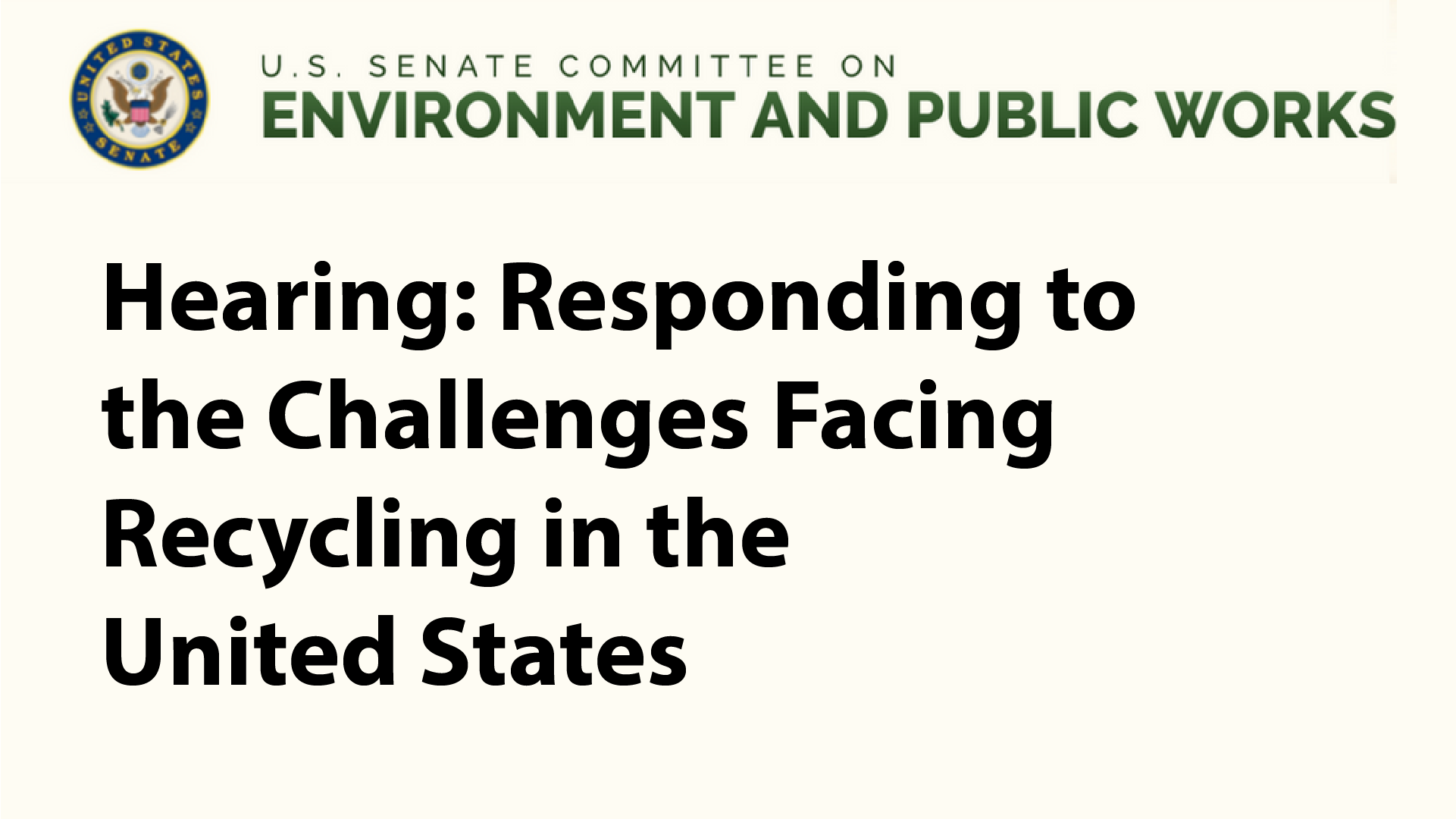This website uses cookies so that we can provide you with the best user experience possible. Cookie information is stored in your browser and performs functions such as recognising you when you return to our website and helping our team to understand which sections of the website you find most interesting and useful.
News
Takeaways from the Senate Environment & Public Works Committee Hearing on Recycling
On June 17, the Senate Environment and Public Works Committee held an oversight hearing entitled, “Responding to the challenges facing recycling in the United States.” The committee examined the recent challenges facing recycling programs in the U.S. and the potential solutions to these problems.
Several recycling bills have garnered Congress’s attention this past year but the coronavirus had slowed the substantial momentum they were gaining. Chairman John Barrasso (R-WY) explained that China’s 2018 restrictions on importing materials exposed weaknesses in the U.S.’s current recycling system. The coronavirus pandemic has compounded these challenges causing many cities to have to close down their recycling facilities and halt reduced redemption programs. As Barrasso pointed out, the pandemic has also increased the use of single-use plastic products to avoid contamination but has also lead to the collapse of petroleum prices, reducing the value of many of the recyclable materials.
The general takeaway from hearing was that while plastics add tremendous value to society and are advancing sustainability in other aspects, the U.S. needs to find more ways, and quickly, to further the industry’s recycling efforts.
Extended producer responsibility legislation is not going away.
Senators Tom Udall (D-NM) and Sheldon Whitehouse (D-RI) discussed their efforts in advancing the “Save Our Seas 2.0” bill earlier this year.
Sen. Udall said the root of the problem is that plastic is not manufactured for recycling or reuse, but rather one-time use. He said legislation such as his “Break Free from Plastic Pollution Act” would hold producers accountable and create powerful incentives for producers to design products that are more sustainable and easier to recycle. Some of the bill’s highlights include:
- Reducing and eventually banning the manufacturing of plastic bags and items that can’t be recycled mechanically.
- Using deposits on beverage containers.
- Prohibiting exporting plastic waste overseas.
- Prohibit advanced recycling..
Udall’s bill also calls on stronger regulations to discourage the building of more plastic producing plants, referring to them as “greenhouse gas super polluters” and an environmental hazard to the communities around them.
The current recycling system is confusing.
Meghan Stasz, Vice President for Packaging and Sustainability at the Consumer Brands Association, repeatedly called on the need for national standards on recycling, saying that the current system is too fragmented and confusing to citizens. With more than 10,000 recycling systems in the U.S., Stasz says the country needs to use financing to drive desired behaviors, to solve specific problems, not simply to overlay additional funds on a system that isn’t working.
Infrastructure and economic drivers could help solve the recycling problem.
Bridget Croke, Managing Director of Closed Loop Partners, testified on the importance of investing in infrastructure and innovative solutions to minimalize waste and ensuring recycled materials become the manufacturing feedstock for future products and packaging.
Croke’s investment and innovation firm work with private industry to establish and profit from a circular economy. She says a circular economy will eliminate communities spending billions of dollars on disposal, turn waste into value while creating good jobs, and minimize taxpayer dollars spent on waste management. Crock also advocated for more innovation in robotics and artificial intelligence in recycling, packaging innovation, and advanced recycling technologies.
Nina Bellucci Butler, CEO of More Recycling discussed the paradox of plastic – that the same things that make it so beneficial to society and enhance our ways of life also make it more difficult for it to be reabsorbed into the ecosystem.
She advocated finding economic drivers and a way to putting a value on carbon and human ingenuity to help design, implement, track, and optimize a sustainable resource management plan to serve as a “north star.” Bellucci Butler also emphasized to Sen. Tom Carper (D-DE) that a sustainable materials management plan must include EPR to truly level the playing field and set the right economic drivers in place.
Plastic bans are still not the answer.
Committee members Barrasso, Carper, and Ben Inhofe (R-OK) asked questions focused mostly on bans on particular plastics, possible incentives that might encourage recycling, what role the federal government has in recycling, and the role industry should play in bearing the costs of cleanup of plastic pollution. But both Stasz and Bellucci Butler explained that the plastics problem is daunting and often leading having to navigate tradeoffs, including the possibility of significantly increasing greenhouse gas emissions by omitting certain plastics without changing U.S. consumptions patterns and economic models.
Other unintentional consequences could include escalating costs of getting products to consumers and creating unintended waste. As many lawmakers and witnesses repeated, there is no “one silver bullet,” so several approaches need to be taken.
Croke told Sen. Carper the federal government could help by finding ways to stabilize prices so that recycled content goes back into the manufacturing supply chains to compete with the raw material supply chain. She also advocated for tax incentives and other methods for the government to incentivize market demand for recycled plastic and other packaging materials. Stasz said that collecting, standardizing, and harmonizing data is essential so that baselines can be established. In response to Sen. Gillibrand’s (D-NY) question on industry’s role in recycling, Bellucci Butler again reiterated the importance of EPR and that a bottle bill, minimum recycled content legislation, is also critical.


